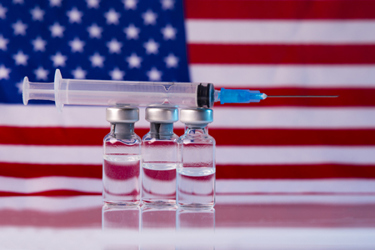Patients Need Faster Access To Approved FDA Vaccines. What Can We Do?
By Robert Popovian, Global Healthy Living Foundation / Pioneer Institute / Progressive Policy Institute

There are times when a significant lag between the FDA approval of vaccines and the Centers for Disease Control and Prevention (CDC) recommendation of those vaccines throws any newly approved vaccines into patient access purgatory. Such action has occurred several times in the last few years, as guidance from CDC has taken several months or years to come to fruition after FDA approval.1,2
Unlike medicines or devices, patients and healthcare professionals don’t partake in the benefits of vaccines unless CDC provides guidance on who may receive the vaccines at what specific interval or, at times, provides guidance that does not align with FDA-approved usage. This leaves patients and healthcare professionals in a regulatory twilight zone since the FDA has approved the vaccine as safe and effective while CDC has failed to provide prompt guidance for its use or has provided recommendation contradicting the FDA-approved indication(s).
The lack of recommendations from the CDC makes providers reluctant to administer a vaccine until the CDC bestows its blessing. More importantly, this regulatory malaise has prohibited pharmacists in some states from administering vaccines to patients in need. Focusing on the unnecessary prohibition is critical since pharmacies are far more accessible to patients than physician offices in low-income communities that are overrepresented by racial and ethnic minorities.3
An interesting question arises from the FDA and CDC processes regarding vaccines. Does the CDC know more than the FDA about the safety and efficacy of a vaccine? Should a CDC recommendation supersede FDA approval of a vaccine? After all, even though the FDA is the drug regulatory gold standard worldwide, no one can benefit from the vaccines until CDC imparts its acceptance since almost all providers are prohibited or unwilling to provide the immunization without it.
This vortex of uncertainty between the two agencies is playing out in real-time regarding the latest iteration of the COVID-19 booster. On June 16, 2023, the FDA advised manufacturers to develop vaccines with a monovalent XBB 1.5 composition.4 Although political expediency has declared an end to the COVID-19 pandemic, based on the latest CDC data, more than 20,000 Americans will perish due to the COVID-19 virus in the next 12 months if confirmed mortality trends continue as reported.5 Therefore, the new booster is excellent news for many vulnerable to this deadly virus, particularly seniors and immunocompromised patients. Unfortunately, for unknown reasons, the CDC will not provide guidance for administering the new Covid vaccine until mid to late September, an entire month after when experts typically recommend patients receive a flu vaccine.6 So, what do the administration of flu and COVID-19 vaccines have to do with one another? Typically, it is easier for patients to receive both doses simultaneously, thus avoiding multiple visits to a physician's office or a pharmacy.
The time lag between FDA approval of a vaccine and the CDC’s recommendation impacts patients who overwhelmingly choose to receive their Covid or flu vaccines at a pharmacy or the low-income communities where pharmacies are far more accessible and in the three-quarters of the states that do not allow a pharmacist to administer a vaccine unless the CDC recommends it.3,7,8 Such inaction creates an additional burden on physicians, more cost to the health system, more direct and in-direct cost to patients (it costs more to receive a vaccine at their physician's office than a pharmacy), and the real possibility of those needing prevention forgoing immunization.
So: What can the industry and the government do to serve patients better?
Calls To Action
For Vaccine Developers/Manufacturers:
- Support the American Disease Prevention Coalition (ADPC), an alliance of patient organizations, pharmacies, providers, distributors, and manufacturers that has come together to advocate for updating state laws to allow pharmacists to provide immunization on par with their physician colleagues.9
- To expedite the CDC review process, conduct budget impact and cost-effective analysis prior to the CDC review by collecting appropriate economic utilization data during the clinical trial phase. Economic analysis has become a standard requirement by the CDC for any vaccine evaluation.
- Work with Congress to codify into law a specific timeline for which the CDC must publish recommendations in the MMWR post-FDA approval of a vaccine.
For State Lawmakers:
- Enact laws that allow pharmacists to administer all FDA-approved and/or CDC-recommended vaccines. Doing so will protect lives, reduce suffering, save money, and make our healthcare system more equitable.
For the Centers for Medicare & Medicaid Services (CMS):
- Encourage private insurers to provide prompt coverage when MMWR has published the CDC recommendation, thus expanding patient access.
Recent FDA action has allowed patients with Alzheimer's to have hope, reduced access challenges for effective contraception, and let the elderly and infants benefit from effective treatment and prevention for RSV. However, despite FDA approval, patients must wait until CDC provides a recommendation before receiving these vaccines. State and federal policymakers' lack of focused action leaves patients and providers in limbo for new vaccines. The additional regulatory hurdle is sometimes innocuous, but more often than not, it’s an unnecessary burden for patients in need.
- https://www.drugs.com/newdrugs/fda-expands-prevnar-13-vaccine-ages-50-older-3011.html
- https://www.cdc.gov/mmwr/preview/mmwrhtml/mm6337a4.htm
- https://www.japha.org/article/S1544-3191(22)00094-2/fulltext
- https://www.fda.gov/vaccines-blood-biologics/updated-covid-19-vaccines-use-united-states-beginning-fall-2023
- https://covid.cdc.gov/covid-data-tracker/#trends_weeklydeaths_select_00
- https://www.cdc.gov/vaccines/covid-19/downloads/HHS-Commercialization-Transition-Guide-508.pdf
- https://www.iqvia.com/insights/the-iqvia-institute/reports/trends-in-vaccine-administration-in-the-united-states
- https://vaccinesshouldntwait.org/in-your-state/
- https://vaccinesshouldntwait.org/
About The Author:
 Robert Popovian, Pharm.D., M.S., is founder of the strategic consulting firm Conquest Advisors. He also serves as chief science officer at the Global Healthy Living Foundation, senior health fellow at the Progressive Policy Institute, and visiting health policy fellow at the Pioneer Institute. He previously served as vice president of U.S. government relations at Pfizer. As an advisor, Popovian serves on the Board of Councilors of the University of Southern California School of Pharmacy and on the Value of Life Sciences Innovation program at the Schaeffer Institute. He completed his doctorate in pharmacy and M.S. degrees in pharmaceutical economics and policy at the University of Southern California. He can be reached via email at rpopovian@gmail.com or on LinkedIn.
Robert Popovian, Pharm.D., M.S., is founder of the strategic consulting firm Conquest Advisors. He also serves as chief science officer at the Global Healthy Living Foundation, senior health fellow at the Progressive Policy Institute, and visiting health policy fellow at the Pioneer Institute. He previously served as vice president of U.S. government relations at Pfizer. As an advisor, Popovian serves on the Board of Councilors of the University of Southern California School of Pharmacy and on the Value of Life Sciences Innovation program at the Schaeffer Institute. He completed his doctorate in pharmacy and M.S. degrees in pharmaceutical economics and policy at the University of Southern California. He can be reached via email at rpopovian@gmail.com or on LinkedIn.
